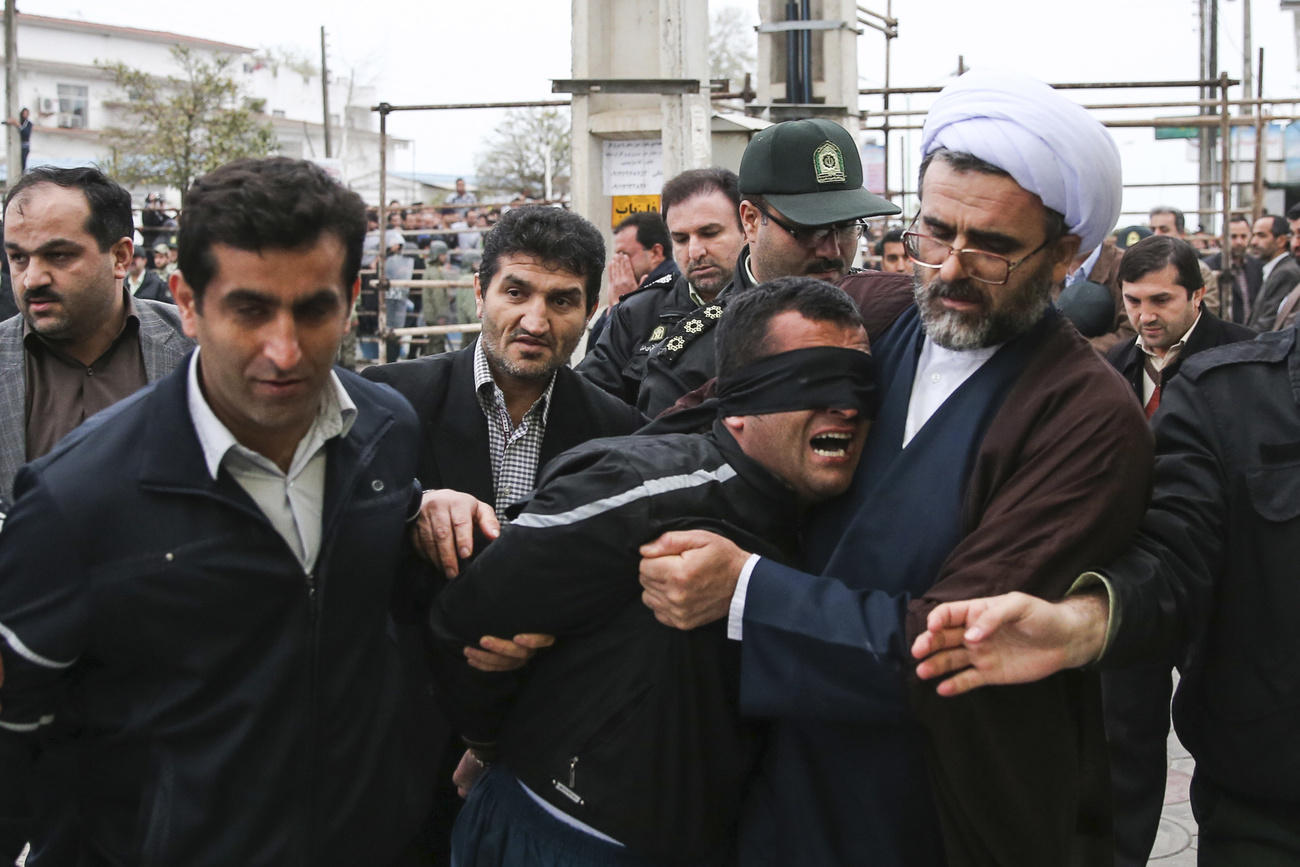How states are trying to slowly kill off the death penalty

Switzerland and other countries last week managed to push through a resolution against the death penalty at the United Nations Human Rights Council. Over the past decade the small alpine nation has strongly opposed capital punishment, which has seen a slow decline.
While critics have accused Switzerland of keeping a low human rights profile since Ignazio Cassis took over as head of the Federal Department of Foreign Affairs (FDFA) in 2017, the country has continued its strong commitment to abolish the death penaltyExternal link and keep the issue at the top of the international agenda.
“Switzerland strongly deplores the fact that in 2019 the international community has again witnessed mass executions and those of minors,” Swiss ambassador to the United Nations in Geneva Valentin Zellweger told the councilExternal link, which concluded its 42nd session last Friday.
In his speech, the Swiss diplomat urged the 10 countries with the highest total number of executions – China, Iran, Saudi Arabia, Vietnam, Iraq, Egypt, the United States, Japan, Pakistan and Singapore – to abolish or suspend capital punishment.

Global decline, but individual rises
But according to Amnesty International’s most recent report on the death penalty covering 2018External link, these countries are not all exactly in the same position.
“Overall, the total number of executions recorded fell by more than 30% [between 2018 and 2017], mainly due to sharp decreases seen in some of the countries that use it most, such as Iraq, Iran, Pakistan and Somalia,” it noted.
But Amnesty noted reversals: “For the first time since 2009, Thailand has carried out an execution, and several other countries reported an increase in the total number of executions recorded during the year, including Belarus, the United States, Japan, Singapore and South Sudan.”
There were also significant increases in the number of death sentences handed down in countries such as Egypt and Iraq, the NGO said.
The few statistics made public by the Vietnamese authorities indicate that Vietnam has made extensive use of the death penalty. In China, the use of the capital punishment is still surrounded by secrecy, but Amnesty believes that the country continues to condemn and execute thousands of people.
Successful resolution
It was not surprising, therefore, that some of these states tried to weaken a human rights resolution on the death penalty, via amendments or by voting against it last Friday. In the end the resolution, which was co-sponsored by Switzerland, was adopted by 26 states, 14 were against and there were six abstentions.
#HRC42External link Council adopts with 26Y, 14N, 6Abst. res. on the question of the #DeathPenaltyExternal link & stresses that under no circumstances can the death penalty ever be applied as sanction against specific forms of conduct such as #adulteryExternal link, #blasphemyExternal link, #homosexualityExternal link, #apostasyExternal link…@UNGenevaExternal link pic.twitter.com/KZ3PK3l8VfExternal link
— HRC SECRETARIAT (@UN_HRC) September 27, 2019External link
Hilary Power, a representative of Amnesty International at the UN in Geneva, welcomed the result and stressed the continuing positive momentum for the abolition of the death penalty. But she added: “We are concerned about the possible resumption of executions in Sri Lanka and the possible reintroduction of the death penalty in the Philippines”.
In the resolution approved last week, the council decided that the upcoming biennial high-level panel discussion to be held at the 46th session of the UN Human Rights Council will address human rights violations related to the use of the death penalty, in particular with respect to whether the use of the death penalty has a deterrent effect on crime rate. It also requests the Office of the High Commissioner to prepare a summary report on the panel discussion and to submit it to the Human Rights Council at its 48th session.
Long-term programme
What is exact purpose of such a resolution? Presented every two years, it examines human rights violations caused by capital punishment legislation when it targets, for example, homosexuals, minors or ethnic minorities. The resolution does not directly aim to abolish the death penalty or call for a moratorium, which is the subject of a resolution adopted by the United Nations General Assembly. It simply tries to encourage countries where the death penalty is still in force to reduce its scope.
Iran, for example, has abandoned the death penalty for drug cases, which led to a sharp drop in the number of executions last year.
Friday’s resolution is part of a Swiss foreign ministry’s 2017-2019 action plan for the universal abolition of the death penaltyExternal link, which was drawn up a decade ago and renewed. The strategy involves different channels and approaches, with support from an ad hoc coalition of external NGOsExternal link. A similar strategy was pursued in the case of the 1997 Ottowa landmine ban treaty.
Translated from French by Simon Bradley

In compliance with the JTI standards
More: SWI swissinfo.ch certified by the Journalism Trust Initiative













You can find an overview of ongoing debates with our journalists here . Please join us!
If you want to start a conversation about a topic raised in this article or want to report factual errors, email us at english@swissinfo.ch.